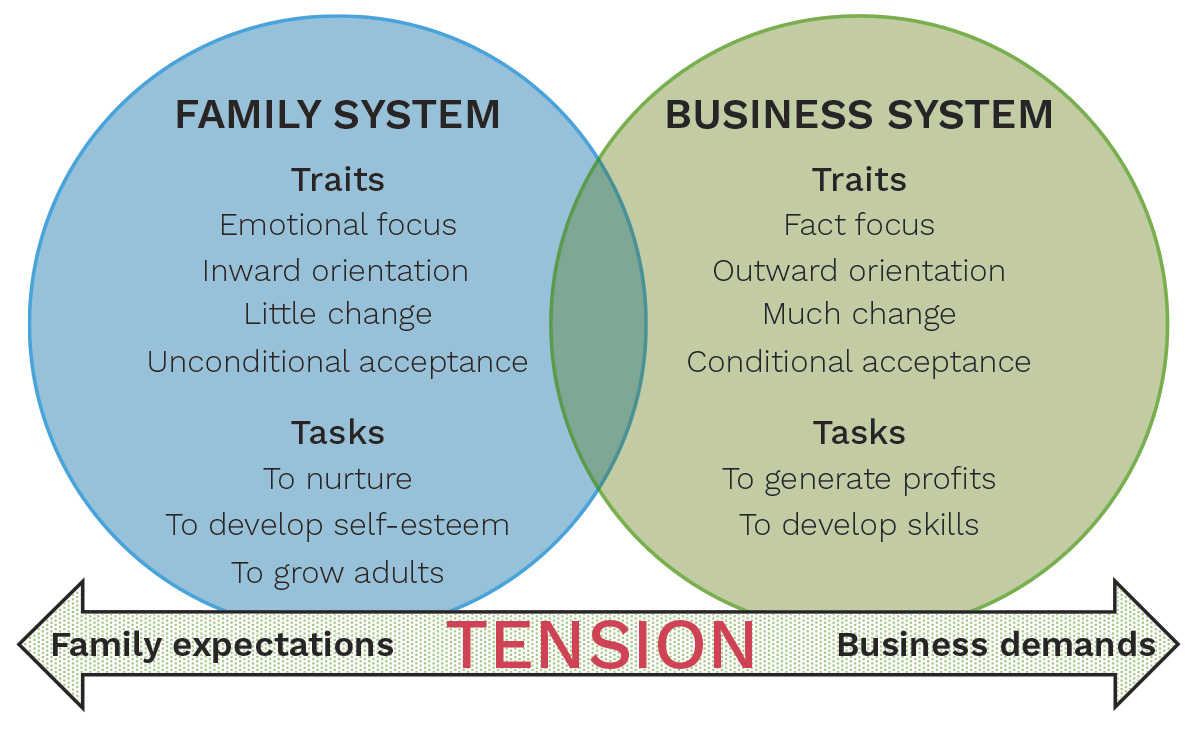Family business succession that builds family relationships and continues to perpetuate a successful business requires attention, time investment, deliberate planning and communication.
We need to free each other up to think about what success looks like – how next gens and current owners and managers think about what success is for them – and make sure we fit that in, said Barb Dartt, family business consultant and former veterinarian and economist, who led a presentation on succession planning at the Northeast Dairy Management Conference.
“Weʼre overlapping two systems that have very different purposes,” she said. “A family is inclusive; itʼs got an emotional base. The purpose of a family is to grow productive adults to contribute to society. Contrast that with a business, where you get included if your value exceeds the costs. It’s merit-based and not as emotionally based. The goal of the business is to generate profits.”
Trying to balance both needs creates tension, period, she said, and the work of succession lands right in that tension. Some of the weight of succession is about legacy, continuing the family’s identity and reputation. And some of the weight is around the business – is the next gen able to manage and own effectively together? How do we untangle all those hopes, fears, and conflicting priorities?

“To have a successful succession, you start by preparing the business leader(s) themselves - the ones transitioning in business,” Darrt said. “We also have to prepare the business for this transition. And then we should think about preparing the successors. These three steps don’t happen in a neat order – they also tend to happen simultaneously. So, the overlapping family and business systems create tension, and we have a lot of preparation to do. It can be very difficult to figure out where to even start succession.”
Dartt asked a next-gen successor who worked in a successful family business, “How is your career path in the business progressing?” Her reply is like many other next gens who believe they’re stepping up, taking responsibility, and proving themselves, while the senior generation continues to behave as if they don’t believe the next gen is responsible and committed. The next-gen successor said:
“My dad and uncle keep telling me I need to grab hold. What else can I do? I was asked to take a job elsewhere after college – try out a different company, a different boss. I moved two states away to a great role. I learned a ton. I moved up the ladder – even stayed a few years longer than I planned. I really enjoyed it. But I had the family business ‘bug.’ I sent a proposal to my dad and uncle about a role I thought I could fill back home. They accepted, invited me back. I took a bit of a pay cut, but my husband and I were okay with that. It was worth it to be in our home state, around family. That was three years ago. Despite the invitation and their agreement that I’m doing a great job, I’m questioned at every turn. Decisions that they said (out loud!) were mine are changed, without me knowing. I’m not even asked – I just find out later. It is so frustrating. I’m not sure how much longer I can do this.”
Dartt shares these suggestions for how next gens can, respectfully, prove they’re ready:
1. Earn it. Put in the time and effort required to operate, lead and (potentially) own your family business.
Learn from parents, uncles, older cousins, and siblings. Learn about financials, business management, and family dynamics. Build relationships. Understand that if you’re learning, taking on more duties over time, and gaining confidence, you are “earning” it – earning more responsibility and decision-making. At the same time, some parents are micromanagers. They can have unreasonable or unspoken expectations. How do you know the difference? Work on self-awareness, and find one or two non-family mentors, folks you trust to give honest (and sometimes tough) feedback on your own progress and capabilities.
2. Communicate, communicate, communicate. Model what you expect – especially when no one else will.
Take the extra time, even though your plate is full, to share and listen. Share what’s important to you, why you prioritized a particular job that day, how you’re feeling about the progress you’re making within your business role and listen. Ask questions like “If you had one thing you could go back and do over, what would it be?” Or “What time in the business were you most worried?” Some senior gens aren’t big talkers. Make it your own little challenge – When do they seem most open to conversations? What kinds of topics get the most responses? How can you be the team member who is weaving a strong fabric of trust and shared understanding among family and key employees?
3. If necessary, lead succession by being an influencer. DO NOT wait for “This to all be yours… someday.”
The senior gen may never address succession. Their fears – loss of control, loss of income, loss of identity, loss of stature – may prevent them from embracing the profound challenge of watching someone who isn’t as good as them take on a job they love and excel at. If your parents are the biggest barrier to succession planning, use all your extra resources to figure out what’s holding them back. Ask people they trust what might be getting in their way. And, if you can find the right time, ask them something like, “You say continuing this business is important. And it seems like planning for that is hard for you. In fact, some of your behaviors feel to me like they’re directly opposite of ensuring succession. Can I share a couple of those with you?”
4. Be ready when they (finally) say “Let’s get started.”
Don’t get bitter. Do what you can with what you have, where you are. And, if you feel yourself putting too much of your professional or personal life on hold, like the next gen in the example above, start thinking about what life might look like if you didn’t work in the family business. Successful succession does not always mean everyone works and owns happily together. Sometimes success means that family relationships can grow because family are NOT working or owning together. Just because you don’t work together doesn’t mean you’re not family.
“This succession stuff is some of the hardest work you’ll ever do,” Dartt tells the senior generation. “Next gens – I know this process can be awfully hard on you, too. If I could pick one action item from above, I’d suggest finding one or two trusted folks to serve as your sounding board. Sometimes, as a successor, your pace is too fast, your expectations unrealistic, your skills not yet developed. And, sometimes, your folks will never get out of the way. Usually, the truth lies somewhere in between those two scenarios. And, when you’re in the thick of it, it’s awfully hard to find that truth. Lean on outsiders who can take away some of the emotion and help you see the situation more objectively.”






